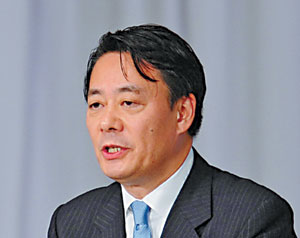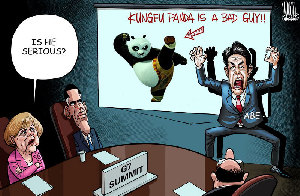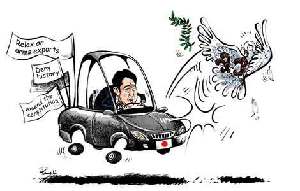PM has alienated key allies, made 'authoritarian tendencies clear'
Japan's main opposition leader chided Prime Minister Shinzo Abe on Tuesday for conservative statements on wartime history and voiced fears he could be a "destabilizing" factor in East Asia.
 |
|
Banri Kaieda, president of the opposition Democratic Party of Japan |
Kaieda said that Abe government's remarks and actions had alienated Japan's neighbors as well as its US and European allies by "fueling suspicions that Prime Minister Abe may be a historical revisionist".
"I clearly reject historical revisionism and will oppose it," Kaieda said at the Brookings Institution think tank, vowing that his party "will safeguard the mature democracy fostered by post-war Japanese society".
"Domestically, the Abe administration has now made its authoritarian tendencies clear, and internationally, the Abe administration could move beyond the realm of healthy nationalism and become a destabilizing factor in East Asia," Kaieda said.
In December, Abe visited the Yasukuni Shrine, which honors 2.5 million Japanese war dead, including 14 convicted war criminals from World War II. The move outraged China and South Korea and led to a rare public rebuke by the United States, Japan's main ally.
Abe - whose grandfather was arrested, but not prosecuted as a war criminal - is known for his conservative views. While in opposition, he questioned whether imperial Japan forced women into sexual slavery, although he has since indicated he will not revoke a landmark 1993 apology to the "comfort women".
Nationalist agenda
Liang Yunxiang, a professor of Japanese studies at Peking University, said the Japanese opposition's censure of Abe reflects the deep public anxiety that his aggressive nationalism has caused in Japan.
"Many fear a deteriorating relationship with China, which would not be in the interests of Japan. And the US is also opposed to Abe's revision of its wartime history," he said.
In an article published in January on the Canadian International Council's website, Joseph Caron, former Canadian ambassador to Japan and China, said that the Yasukuni Shrine encapsulates many elements of Abe's nationalist agenda: historical and constitutional revision; re-emphasizing patriotism in the education of young people; increasing defense expenditure; a regional security policy overlaying the US-Japan security treaty; strengthening security policy delivery through a state secrecies act and the establishment of a national security council.
"As difficult as it can be, at some point Abe will have to try to see Japan's history as the Chinese, Koreans and others see it. Abe not only has to say the right things ... he has to acknowledge through his actions that he actually means what he says," Caron wrote.
Liang said Abe is taking advantage of the nationalistic sentiments of the Japanese public to achieve many of his political goals.
Kaieda voiced hope for strong relations with both Asian neighbors and the United States, saying that Japan could still voice concerns over actions by a rising China while expressing remorse for the past.
Kaieda repeatedly portrayed himself as an ideological soul mate of President Barack Obama, saying that his party shared the US Democrats' principles of social inclusion.
The DPJ "wants an open nation that's cosmopolitan, multicultural - an open nation with no gender discrimination. We will thoroughly oppose xenophobia", he said.
The center-left party led Japan from 2009 until 2012 when it was crushed by Abe's Liberal Democratic Party. The ruling coalition later won upper house elections, handing Abe a stronger political position than any Japanese prime minister in nearly a decade.
On Tuesday, some 3,000 people rallied in a Tokyo park against government plans to soften Japan's constitutional commitment to pacifism and give its military a more active role. Speaking at the rally, Nobel literature laureate Kenzaburo Oe said the Japanese spirit is facing its most serious threat in the past 100 years.
"By exercising collective self-defense, Japan will directly participate in a war," Oe said.
|
 |
 |
